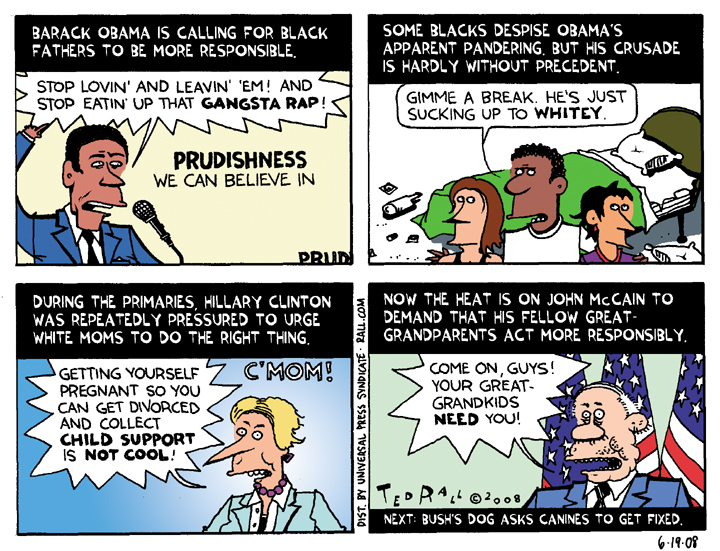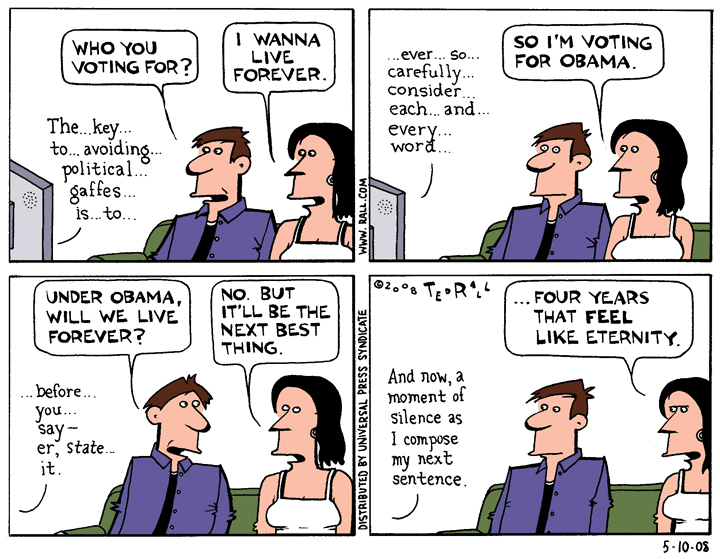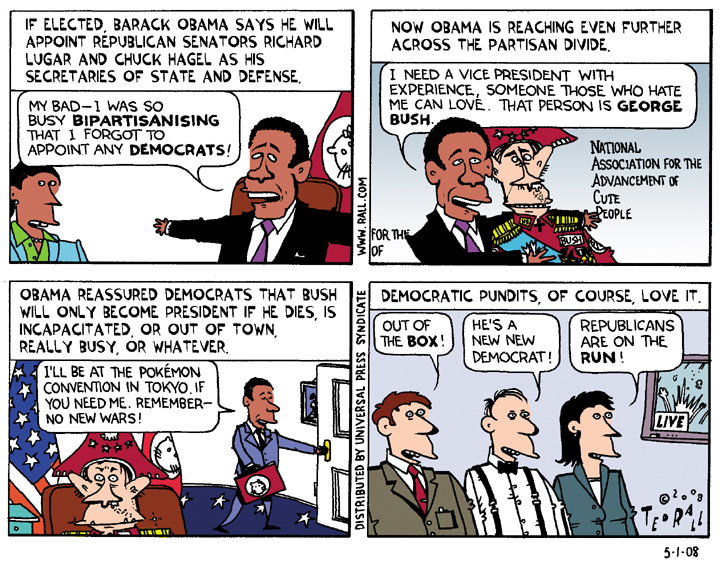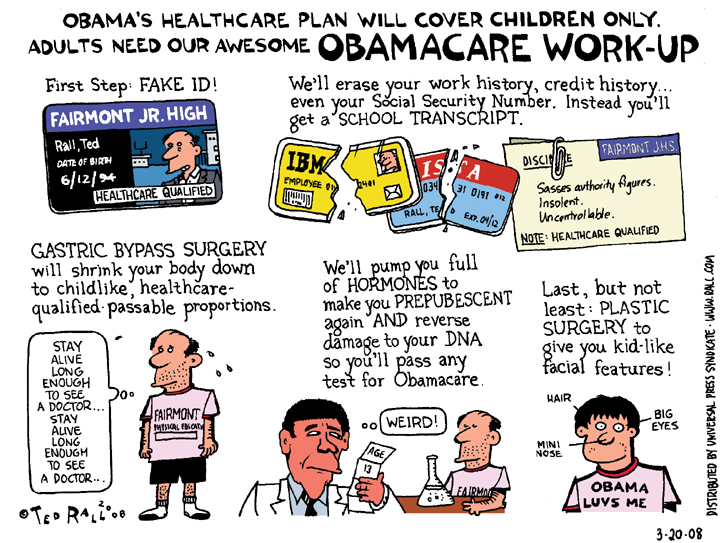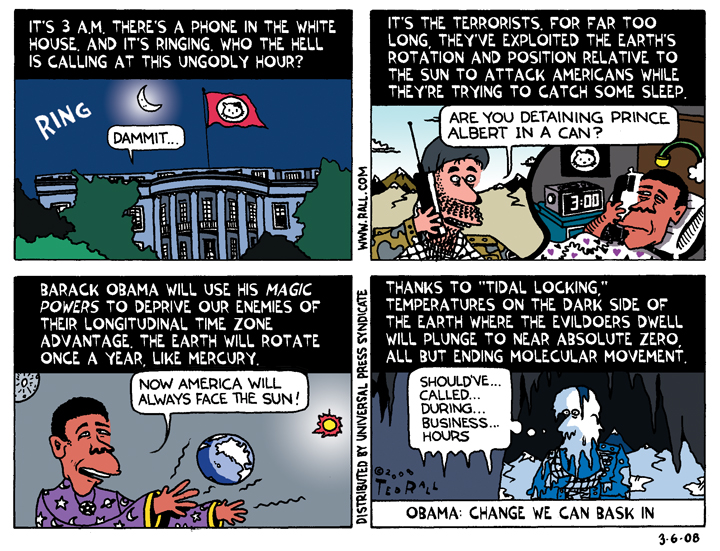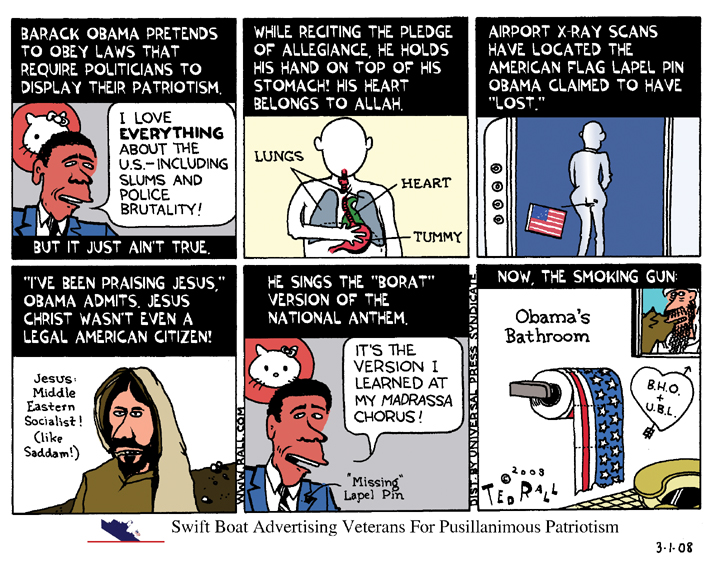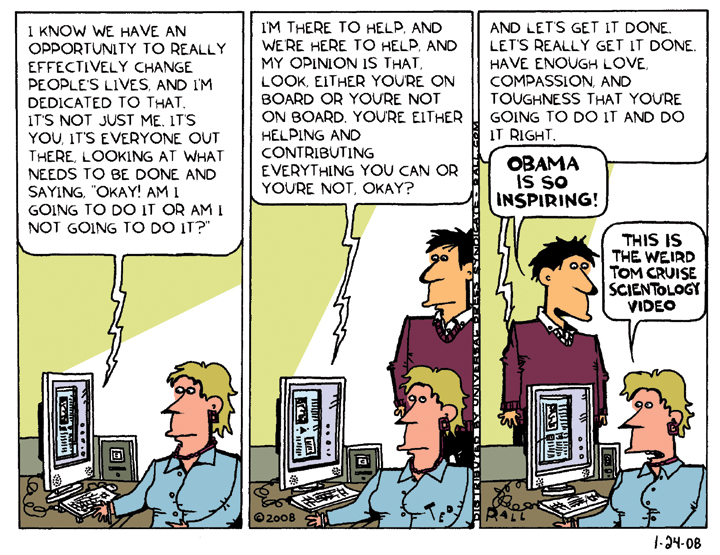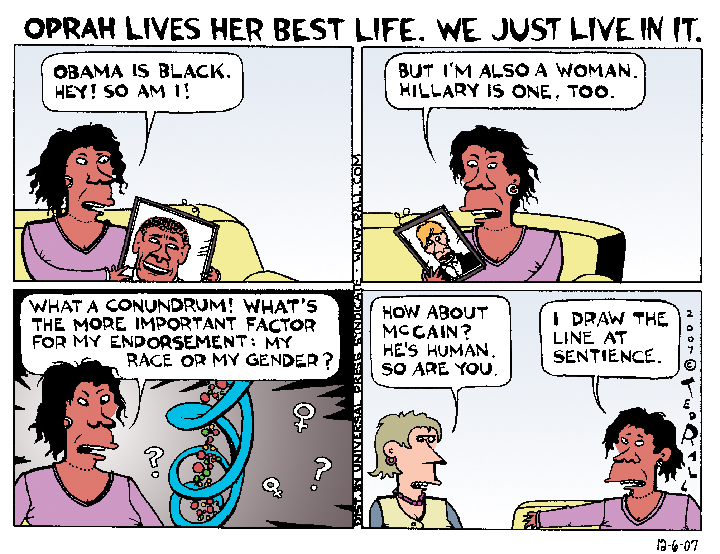Barack Obama, trying to court conservative whites with dim views of black males, attacks black men for being bad parents.
SYNDICATED COLUMN: It Takes a Symbol to Hold Back a Nation of Millions
The Empty Politics of Singularity
As an African-American, Ward Connerly uses his skin color to draw attention to his otherwise unremarkable politics: he’s a right-wing Republican who hates affirmative action. Now this ideological freak is using Barack Obama’s racial heritage (half of it, anyway) to argue that racism is all in the past.
“The entire argument for race preferences is that society is institutionally racist and institutionally sexist, and you need affirmative action to level the playing field,” Connerly told The New York Times after Obama claimed the Democratic nomination. “The historic success of Senator Obama, as well as Senator Clinton, dismantles that argument.”
Connerly said he “choked up” at the sight of Obama’s victory. “He did it by his own achievement. Nobody gave it to him.” Well, sure. Except for a little help from Chicago’s Daley political machine (a.k.a. white guys). Obama may also have benefited from a race-based preference when his application arrived at Columbia College. (Shout-out to my former colleagues at Columbia’s office of admissions and financial aid: free beers for a week for an hour in the archives.)
Behold the politics of singularity. If one (half-)black guy can make it, anyone can. Those who fail have no one to blame but their own lazy, excuse-making selves.
Seven years ago, conservatives like Connerly were pointing to George W. Bush’s cabinet appointments, 50 percent of which went to women or people of color, as proof that minorities no longer had anything to complain about. “If you look at my administration, it’s diverse, and I’m proud of that,” Bush said of Colin Powell and Condi Rice, charter members of African-Americans Against Blacks. Minorities may well have followed the right’s edict to quit whining and start working. But the rise of Alberto Gonzales to attorney general, for example, only helped one Latino: himself.
Even within the White House, tokenism has limits. “The Bush Administration,” found a Newsday study of 2,800 political appointees, “is not nearly as diverse as it appears…Blacks held 7 percent of administration jobs under Bush, less than half of the 16 percent they held under Clinton…Women won 36 percent of Bush’s appointments, noticeably fewer than the 44 percent of Clinton’s.”
Reflexive churlishness aside, after watching my fellow citizens passively accept torture, concentration camps, domestic surveillance, government kidnappings, two useless wars and two stolen elections, Obamamania is fun. It’s refreshing to be proud of my fellow Americans. Those who vote in Democratic primaries, anyway.
So the Democratic Party isn’t racist. What remains to be seen is whether America is. Will general election voters support a thoughtful, vigorous and handsome African-American running against a rigid, aging militarist pushing the policies of the most unpopular president in history?
To prevail in November, Obama must win the votes of millions of whites who supported George W. Bush in 2000 and 2004. Though not necessarily racist themselves, these swing voters were certainly willing to tolerate Bush’s racism. Bush famously beat McCain in the 2000 Republican primaries by waging a whispering campaign about McCain’s “black” daughter by a prostitute (actually, she was born in Bangladesh and was adopted). He also spoke at Bob Jones University. “Bob Jones University is opposed to intermarriage of the races because it breaks down the barriers God has established,” BJU administrators wrote to students in 1998–a ban that remained in force when Bush went there.
McCain is the lamest GOP candidate since Bob Dole, running in the least propitious year for Republicans since 1974. If a black guy can win, this is the year.
To be sure, an Obama victory couldn’t have happened in 1964, when I was one year old, or even 1980, when I was 17. (Reagan won that year by winking at the KKK and decrying black “welfare queens.”) Obama’s inauguration would mark America’s long, but undeniable progress since LBJ signed the Voting Rights Act. A biracial president with a Muslim parent would broadcast to the world that America’s post-9/11 madness is finally winding down. But it would hardly mean that minorities, or women for that matter, had achieved equality.
Disparities in healthcare highlight some of the many inequities in an American economy suffering from staggering disparity of wealth.
Just last week a Dartmouth study showed that African-Americans with diabetes are five times more likely than whites to lose a limb to amputation. Blue Cross and Blue Shield released another survey the same day, this one showing that even African-American women who have medical insurance stand less of a chance of surviving breast cancer than whites. “The death rate for black women from breast cancer was the same up through 1981,” said Dr. Otis Brawley of the American Cancer Society and a professor at Emory University. “Every year, the death rate has gotten more divergent. The difference for black women and white women in 2005 was greater than it was in 1995, and it is greater in ’95 than it was in 1985.”
Everywhere you look, it sucks to be black in America. Swimming classes cost money. African-Americans don’t make as much money as whites. So they don’t sign up their kids at the same rate as whites. It might not sound like a big deal–until you learn that, according to the Centers for Disease Control, black children between the ages of five and 14 drown at two and half times the rate of white kids.
Good for Barack Obama. But our national obsession with the triumph of the individual (while ignoring disasters suffered by millions) reminds me of the old joke about the man in the car driving past a hitchhiker at 60 mph. Their average speed is 30. But they’re each enjoying a different experience.
COPYRIGHT 2008 TED RALL
Terrorist Phone Call Ad
The Clinton campaign rolled out, and the Obama campaign immediately issued a retort to, what looks likely to become one of the iconic television ads of the 2008 race: an image of a red hotline phone ringing at three in the morning in the White House. Many people have parodied this ad, but my take emphasizes the hilarious implication that troublemakers are so inconsiderate as to spark crises while civilized Americans are trying to catch some shut-eye.
Selling Barack
Republicans are accusing Barack Obama of not being patriotic. Their reasons include his decision to stop wearing an American flag lapel pin because the symbol had been hijacked by right-wing neocons, his failure to place his hand over his heart during the National Anthem, and his wife’s comment that she was proud of the United States for the first time during her adult life.
COLUMN: The Politics of Dopes
Barack Obama, Empty Suit
Barack Obama’s supporters compare him to John Kennedy, another great orator whose youth and short political resume opened him to complaints that he didn’t have enough experience to be president. But there’s no comparison. JFK served two terms in the House and won two terms in the Senate before asking us not to ask what he could do for us. If Obama wins, he will only have had four years in Congress, next to Kennedy’s fourteen. (Hillary Clinton, running as a grizzled veteran, would have eight.)
Ted Kennedy is a better analogy. At the start of his 1980 Democratic primary challenge to incumbent President Jimmy Carter, Kennedy was riding high in the polls. But when Roger Mudd of CBS News asked him why he wanted to be president, he fumbled. “Kennedy’s problem,” Paul Waldman wrote in The American Prospect in July 2007, “was not that he didn’t have a good reason to run–he had plenty of them.” His problem was the way he thought about that run. He thought about issues, he thought about the weaknesses of the president he was trying to supplant, he thought about the programs he wanted to institute. What he didn’t construct was a story that explained his candidacy to voters and offered a narrative structure for journalists to use when reporting on him.”
Successful presidential contenders, Waldman argues persuasively, answer Mudd’s classic question with a three-part story. First, the candidate “describes the state of the country and its government, clearly defining what is wrong.” Next comes “the place the candidate wants to take us, the better day being promised.” Then he tells us why he’s the person who can get us there.
Waldman is having a good week. Barack Obama, he predicted a full six months ago, had the best three-part campaign narrative of the major contenders. America’s biggest problem, Obama says, is “partisan bickering,” which he traces to the lingering ideological rifts of the 1960s protest era. His biracial heritage gives white voters a chance to prove they’re not racist. As a Gen Xer, he says he’s the guy to move us past the Boomers’ battles.
Of course, Obama’s three-part story ignores important issues that affect real people–jobs, college tuition costs, taxes, healthcare, Iraq. I’m 44, and I’ve never met anyone who thinks there’s “partisanship in Washington.” (Most voters complain that their party isn’t forceful enough.) It’s a lame sales pitch, though it may work.
What Obama has not done is answer the question: Why does he want to be president? The answer–that it would be a cool addition to his resume–is too unappealing to say out loud.
The night of the New Hampshire primary Obama declared (four times!): “There is something happening in America!” What’s happening? “Change,” he said, “is what’s happening in America.” Change to what? Obama didn’t say.
“Yes, we can,” Obama said (11 times). “Yes, we can, to justice and equality. Yes, we can, to opportunity and prosperity. Yes, we can heal this nation. Yes, we can repair this world. Yes, we can.” Great. How?
He cannot say.
All the candidates, except for John Edwards, want to be president because they want to be president. Winning the presidency is their goal. Like Robert Redford at the end of “The Candidate,” they have no idea what they’ll do if they get the gig.
In his memoirs Nixon chief of staff H.R. Haldeman described moving into the White House after the grueling 1968 campaign. Nearly a year passed, grinding thousands of Americans and Vietnamese to death and dismemberment, as the incoming administration learned to use the phones and master the inner workings of the federal bureaucracy. Defeating Hubert Humphrey hadn’t left enough time to develop a coherent domestic or foreign policy. Setting an agenda was done on the fly, as Nixon’s officials responded to events.
Among presidents in the modern political era, only FDR and LBJ entered the Oval Office knowing what they wanted to do. (George W. Bush–or rather Dick Cheney–knew what he/they wanted to do but didn’t deign to tell us.) It’s no accident that they were two of the most effective leaders of the 20th century, or that their legislative agendas remain cherished legacies of American progress.
If I received a call tonight informing me that I needed to come to Washington because I had somehow been selected president, I would be ready to work tomorrow morning at 9 o’clock. I already know who I’d choose as my secretaries of state, defense and other cabinet appointees. Guantánamo would be shut down. The Department of Homeland Security would be abolished. We’d pull out of NAFTA and the WTO. Torture would be banned; habeas corpus restored. I have tax reform ready to go (soak corporations and the rich, companies that outsource U.S. jobs and use offshore tax shelters would be barred from selling goods to U.S. consumers), a detailed education policy (federal control would replace local control and funding of public schools, colleges and universities would be nationalized and made free) and a plan for healthcare (fully socialized). My foreign policy would go into effect at once: immediate withdrawal from Afghanistan and Iraq, an address to the United Nations apologizing for the wars and the torture and offering reparations, normalizing diplomatic relations with Iran, North Korea and Cuba, and cutting off aid to oppressive dictatorships.
I’m just a writer and cartoonist, but I know exactly what I’d do if I became president. Why doesn’t Barack Obama?
We ought to expect nothing less from the men and women–all professional politicians–who seek the most important office in the country, and on earth.
COPYRIGHT 2008 TED RALL

